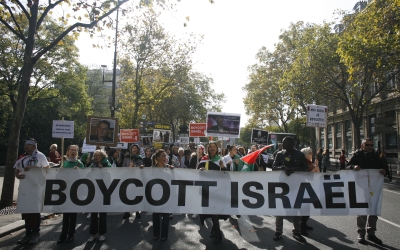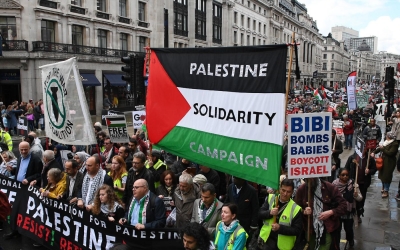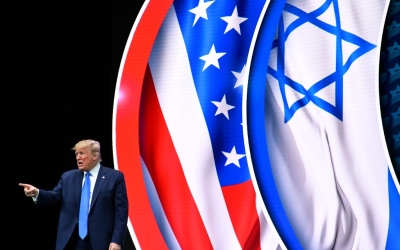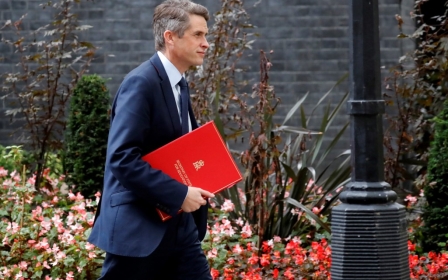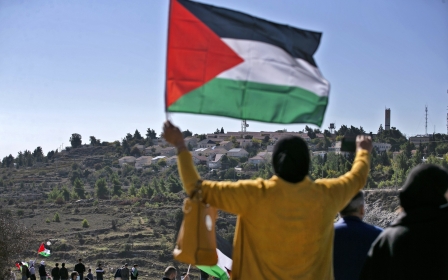In Germany, cultural groups worry about conflation between BDS and antisemitism
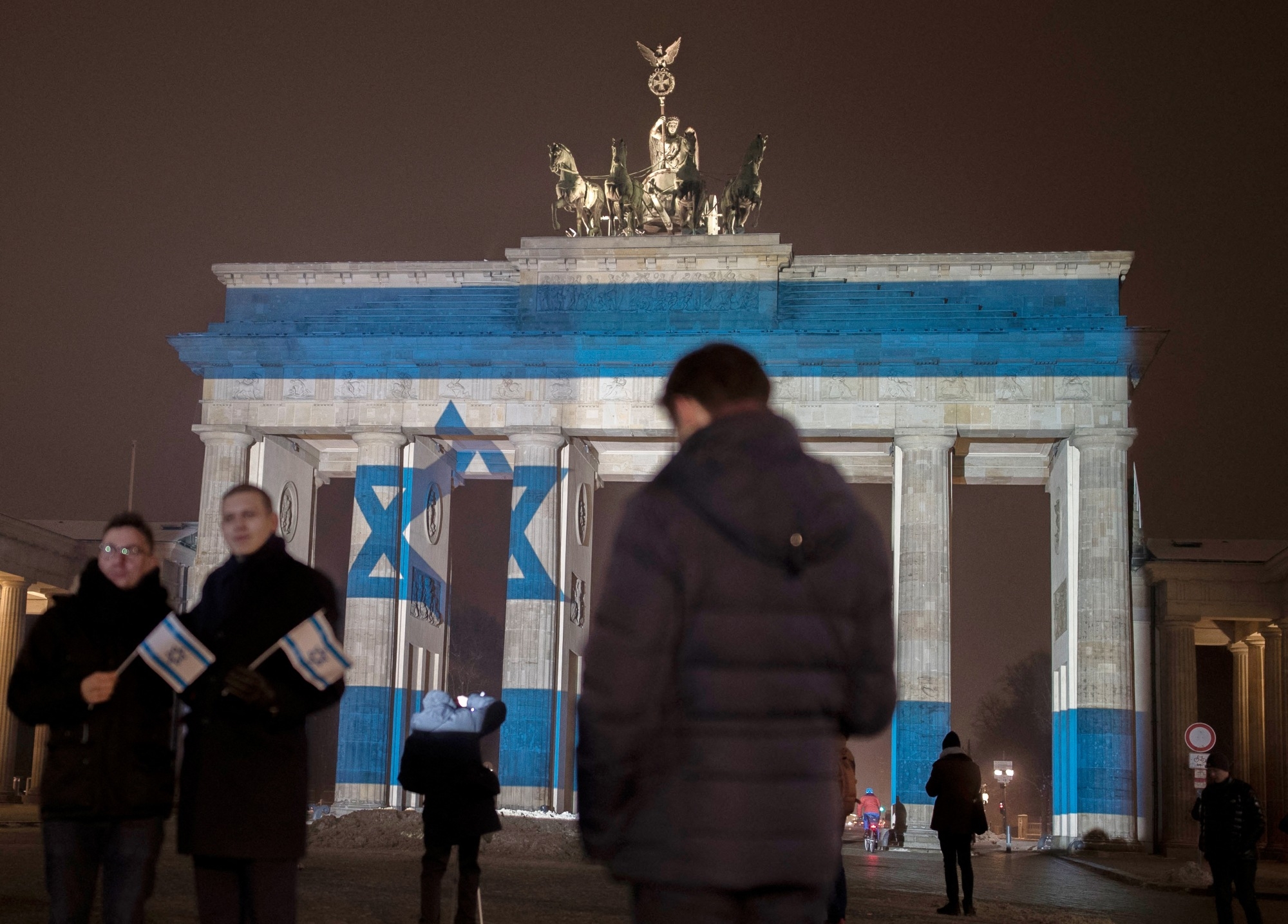
In a press conference which took place in the German Theatre building in Berlin near parliament on Thursday, leaders of some of Germany’s most prestigious cultural organisations expressed their dismay at what they said was becoming a culture of fear amid shrinking spaces for public speech on Israel and Palestine.
The focus of the press conference was a non-binding parliamentary resolution, adopted by a large majority on May 2019, which condemned the Boycott, Divestments and Sanctions (BDS) movement targeting Israel as “antisemitic” and compared it to the Nazi regime’s demands not to buy from Jews. The resolution also called for denying public funding and public spaces to individuals and organisations who support BDS.
The German government never formally adopted the parliament’s resolution, and a verdict of the European Court of Human Rights (EHCR) in June saw French BDS activists successfully appeal a decision by Paris to fine them for their activities.
The ECHR ruled that the BDS movement was protected speech and not antisemitic, effectively overruling the German parliament’s resolution - but few German newspapers reported the ruling.
The group of cultural managers, artists and researchers met in secret and organised the press conference in advance, afraid that the German state institutions would brand them as antisemites. They called their initiative GG 5.3, in reference to Article 5 clause 3 of the German federal constitution - Grundgesetz - guaranteeing freedom of expression.
'We, a group of Jewish-Israelis, were accused of antisemitism for asking questions and creating public conversation on our own history and upbringing"
- Yehudit Yinhar
A one-page press release in both German and English - from organisations including German language institute DAAD, the Goethe-Institute, and leading cultural organisations, university and museum departments - summarised the arguments. While distancing itself from the BDS movement, the initiative stressed the need for free speech and rejected the state’s efforts to condition funding on messages that it supports.
Judith Bernstein is a member of the group Bundestag 3 for Palestine (BT3P), which is suing the German parliament over the resolution equating BDS with antisemitism.
"The BT3P is suing because we are repeatedly defamed as antisemitic on the basis of the Bundestag resolution and are denied rooms for events,” she told Middle East Eye. “Most recently, we won a case against a room cancellation by the city of Frankfurt. The ruling reiterated that anti-BDS resolutions must not restrict BT3P's fundamental rights."
Crackdown on events
Since art is publicly funded in Germany, the resolution has been interpreted as not only denying public funding to BDS events, but to events involving participants who are suspected of supporting the boycott, regardless of whether BDS is part of the programme.
As such, culture institutions argue that they find themselves forced to undertake the role of “thought police” and check participants’ opinions on Israel and Palestine, even if the events they are participating in are not intended to be political.
The resulting turmoil in the German media reached almost every newspaper and television channel. The debate has been reported widely in Israel and in the New York Times.
In multiple media interviews, speakers for the GG 5.3 group have mentioned specific cases of repression of freedom of speech in the name of the parliament’s anti-BDS resolution.
First was the resignation of the director of the Jewish Museum in Berlin, Peter Schafer, in June 2019, after he came under attack by pro-Israel groups in Germany for retweeting a statement by 240 Jewish scholars that criticized the parliament’s resolution.
Then there were the calls to ban Cameroonian scholar Achille Mbembe from speaking at a cultural festival in May - which was eventually cancelled due to the Covid-19 pandemic - over past comments critical of the occupation. Germany’s government official responsible for the fight against antisemitism, Felix Klein, accused Mbembe of antisemitism, in a move that was widely condemned by German intellectuals as racist.
Einstein and Arendt 'would be banned'
More recently, an art college in Berlin pulled its support for a project called “School for Unlearning Zionism” organised by Jewish-Israelis, even though BDS was not mentioned in the programme, adopting an interpretation of the parliament’s resolution extending to all critiques of Zionism.
The GG 5.3 organisers worry that in Germany’s “McCarthyist” environment today, prominent Jewish thinkers would be banned unless they express pro-Israeli views.
The kind of criticism against the state of Israel which was uttered by Albert Einstein and Hannah Arendt would now be labelled as “antisemitic”, they warned, adding that contemporary progressive Jewish authors such as Naomi Klein, Noam Chomsky or Judith Butler were not invited to speak in the country because of their support for BDS.
Klein has defended the parliamentary resolution in a radio interview, saying that not all criticism of Israel was banned. But he defined critique of the state of Israel as antisemitic based on the controversial International Holocaust Remembrance Alliance (IHRA) definition of antisemitism, which critics have said conflates Judaism and Zionism, and leaves little room for condemnation of Israeli policies.
For Yehudit Yinhar, one of the co-founders of the banned art college project, regardless of the supposed limits of the resolution, the atmosphere in Germany has become worrying.
“We, a group of Jewish-Israelis, were accused of antisemitism for asking questions and creating public conversation on our own history and upbringing,” she told MEE. “This creates a culture of fear in which marginalised voices are silenced.”
Middle East Eye propose une couverture et une analyse indépendantes et incomparables du Moyen-Orient, de l’Afrique du Nord et d’autres régions du monde. Pour en savoir plus sur la reprise de ce contenu et les frais qui s’appliquent, veuillez remplir ce formulaire [en anglais]. Pour en savoir plus sur MEE, cliquez ici [en anglais].


